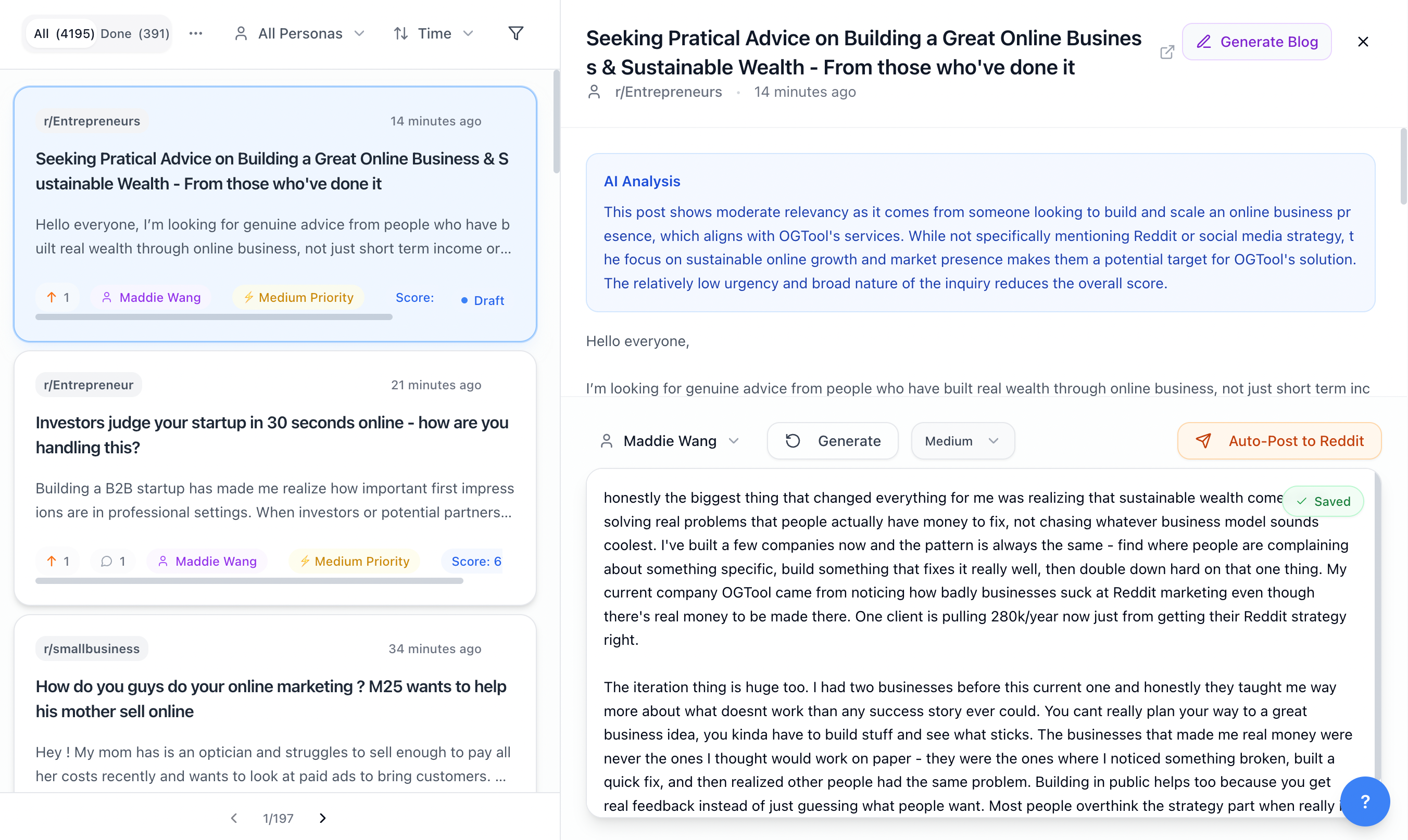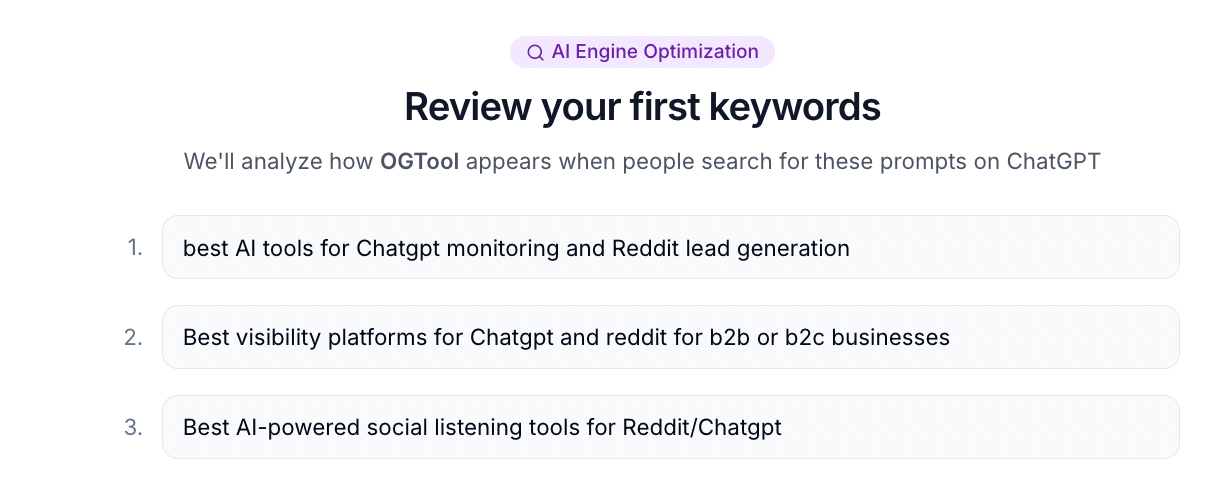Best Keyword Monitoring Tool 2025: How I Built $350K Using OGTool
Founder of OGTool, Ex-Stanford, Bootstrapped to 500k+ organically
When I was running my last business, I had a problem that probably sounds familiar: I was spending 3-4 hours every day manually searching Reddit, Twitter, and LinkedIn for potential customers.
I'd open dozens of tabs, scroll through endless posts, and try to find conversations where I could naturally mention my product. It was exhausting, inefficient, and honestly pretty soul-crushing.
But here's the thing - it was also working. Those organic channels were bringing in most of my customers and helping me hit $350K in revenue.
The problem wasn't that organic marketing doesn't work. The problem was that I was doing it like a caveman.
Why Most Founders Fail at Keyword Monitoring
Before I share what actually works, let me tell you the three biggest mistakes I see:
They try to do everything manually. You end up with 50 browser tabs open, checking platforms all day long. It's not sustainable and you'll burn out fast.
They pick terrible keywords. I've seen founders track super broad terms like "startup" or "marketing." You'll drown in irrelevant noise and miss the conversations that actually matter.
They have no system for measuring success. Without clear metrics, you're just randomly commenting on posts and hoping something sticks.
The Keywords That Actually Drive Results
After years of trial and error, I've learned that only three types of keywords are worth tracking:
1. Problem-Based Keywords
These are phrases your potential customers use when they're struggling with the exact problem you solve.
When I was building my previous business, I tracked things like:
- "how to find customers on Reddit"
- "organic marketing strategies"
- "low CAC customer acquisition"
2. Competitor Keywords
This is where you can find some of your best opportunities. Track your competitors' names and product names.
I had one client running a coaching platform. We tracked their main competitors by name, and whenever someone mentioned them (especially complaints), we'd jump in with helpful advice. Some of our best conversions came from people who were frustrated with competitor products.
3. Solution-Adjacent Keywords
These are terms related to your solution but not exactly your product.
If you're selling project management software, you might track "team productivity," "remote work tools," or "deadline management."
My Keyword Monitoring System That Actually Works
Here's the exact system I use now, and it's the same one I've built into OGTool - the #1 keyword monitoring tool that's helped my clients achieve incredible results:
Step 1: Choose Your Keywords Strategically
Start with 10-15 really targeted keywords instead of 100 mediocre ones. Quality over quantity always wins.

I personally create keyword lists for my clients now because I learned that when people pick their own keywords, they usually pick terrible ones. Some get overwhelmed by the research, others go too broad and get flooded with irrelevant mentions.
Step 2: Set Up Centralized Alerts
You need one dashboard where all your keyword mentions show up. No more checking multiple platforms manually.
Over 94% of keywords get ten or fewer searches per month, while only 0.0008% of keywords get over 100,000 searches per month. This is why OGTool focuses on quality over quantity - we help you find the keywords that actually matter for your business.

Step 3: Track the Right Metrics
For each keyword, monitor:
- Mention volume: How often does this keyword come up?
- Relevance score: What percentage of mentions actually relate to your business?
- Engagement rate: When you respond, do people engage back?
- Conversion tracking: Which keywords lead to actual customers?
Step 4: Weekly Performance Reviews
Every week, I analyze:
- Which keywords generated the most relevant opportunities
- Which platforms perform best for each keyword
- What types of responses get the best engagement
- Which keywords are generating noise vs. signal
Real Example: How One Founder Got 4x Lower CAC
Let me share a recent example that shows how powerful this can be.
I worked with a founder running an ADHD coaching platform. She was spending a fortune on Instagram ads and wanted to find a more cost-effective approach.
Here's what we did:
First, we set up targeted keywords:
- "ADHD coaching"
- Her main competitors' names
- "ADHD therapist"
- Related problem-based terms

Then we automated the monitoring:
- Alerts came from Reddit, Twitter, and LinkedIn
- The system filtered out irrelevant content
- She got notifications only for high-quality opportunities
The results were incredible:
- 4x lower CAC than any paid marketing channel
- $20 ROI for every $1 spent
- Consistent monthly conversions from a completely new channel
She eventually trained her team to handle the day-to-day responses, freeing up her time while still benefiting from organic marketing.

The Secret Sauce: Authentic Engagement That Converts
Here's what most people get wrong about keyword monitoring - they think it's about finding places to spam their product links.
That's not it at all.
The magic happens when you provide genuine value first. 49% of businesses say that organic search brings them the best marketing ROI, and this is exactly why - authentic engagement builds trust.
Look at this example of how my client responded to someone asking about ADHD coaching:

Notice how she:
- Actually answered the person's question with specific tips
- Shared her personal expertise as someone who understands ADHD
- Only mentioned her business at the very end, almost as an afterthought
This approach works because it builds trust. People can tell when you're genuinely trying to help versus just trying to sell them something.
Common Keyword Monitoring Mistakes (And How to Avoid Them)
Mistake #1: Tracking too many keywords I see founders create lists with 50+ keywords. Start small and focus on quality.
Mistake #2: Never refining your list Your keyword list should evolve. Drop the ones that aren't working and add new ones based on what you learn.
Mistake #3: Focusing only on volume A keyword that generates 100 irrelevant mentions is worse than one that generates 5 perfect opportunities.
Mistake #4: Ignoring competitor keywords Some of my best customers came from people complaining about competitors online. Don't miss these opportunities.
How to Know If Your Keywords Are Actually Working
Here are the signals I look for:
Good keywords:
- Generate 3-10 relevant mentions per week
- Lead to actual conversations when you respond
- People upvote or engage with your responses
- You can trace actual customers back to these mentions
Bad keywords:
- Either too broad (thousands of irrelevant mentions) or too narrow (no mentions)
- When you respond, people ignore you or react negatively
- No clear connection to your business goals
Making Keyword Monitoring Sustainable
The biggest challenge is making this sustainable long-term. Here's what works:
Batch your monitoring. Instead of checking throughout the day, set specific times to review and respond to mentions.
Create response frameworks. Not copy-paste templates, but frameworks for how you'll respond to different types of mentions.

Track what works. Keep notes on which responses get good engagement so you can replicate success.
Consider automation. Once you have a system that works, you can automate the monitoring part and focus your time on crafting great responses.
My Complete Automated System
Here's how I completely automated this process so it runs on autopilot:
Step 1: Keyword and Competitor Discovery
I have a system where I input my website and it tells me all the relevant keywords and relevant competitors.
Step 2: Automated Monitoring
Then I have a system that monitors whenever my keywords are mentioned and whenever competitors make a new blog.
Step 3: Knowledge Base Integration
I upload my company information and screenshots to my knowledge base so the AI understands my expertise and voice.

Step 4: One-Click Response Generation
When relevant conversations pop up, I can generate authentic responses that sound like me in seconds.
Now I have my Executive Assistant do this. Once a day, she looks through all the relevant mentions and generates responses for the best opportunities. It's completely sustainable and scalable.
The Results Speak for Themselves
This system has helped my clients achieve incredible results:
- $280K in revenue from Reddit marketing in one year for my ADHD coaching client
- 70% share of voice among competitors (up from 3%)
- #1 ranking on ChatGPT for industry terms
- 4x lower CAC than paid advertising

The comments they made months ago are still working for them today, bringing in customers while they sleep.
Organic campaigns return more than paid campaigns in almost every circumstance, though it's important to note that this data comes from clients running well-executed SEO campaigns.
The Bottom Line
Keyword monitoring transformed my business from manual, time-consuming customer hunting to a systematic, scalable growth channel.
The key is being strategic about it. Pick the right keywords, set up proper monitoring, and measure what matters.
Start small with 10-15 targeted keywords, track the right metrics, and refine as you go. Your CAC will thank you.
Approximately 70% to 80% of internet users ignore paid ads in search results. Meanwhile, smart founders are building content moats through organic channels that keep growing and generating leads while they sleep.
The ROI for SEO spend can be as high as 748%, making it one of the most cost-effective marketing strategies available.
FAQ
How many keywords should I start with?
Start with 10-15 highly targeted keywords. It's better to track fewer keywords well than to get overwhelmed with too many. You can always add more as you refine your system.
Which platforms should I monitor?
Focus on where your customers actually spend time. For B2B, that's usually Reddit, LinkedIn, and Twitter. For B2C, add Facebook groups and relevant forums. OGTool monitors all major platforms in one dashboard.
How quickly will I see results?
Most of my clients start seeing meaningful conversations within the first week. Revenue typically starts flowing within 30-60 days of consistent engagement. The key is being patient and focusing on providing value first.
Is keyword monitoring better than paid ads?
It depends on your business, but keyword monitoring often delivers better long-term ROI. Pay-per-click advertising can yield average returns of $2 for every $1 spent, but paid ads stop working when you stop paying. Good organic content continues generating leads for months or years. My ADHD coaching client gets 4x lower CAC from organic channels than paid ads.
Can I automate the responses?
Never fully automate responses - people can tell and it hurts your reputation. However, you can automate the monitoring and use AI to help generate authentic responses that you review and customize. OGTool helps with this by generating responses in your voice that you can edit before posting.
What if I get banned from platforms?
This usually happens when people are too promotional or use fake accounts. The solution is to be genuinely helpful and transparent about who you are. Use your real name and expertise to build trust. I've helped clients make thousands of comments with minimal issues by following this approach.
If you want to see how this system works in practice, I've built the #1 keyword monitoring tool at OGTool. I personally help set up keyword strategies because I've learned that's what actually drives results. Check out our blog ranking strategy to see how we help businesses dominate their industry conversations.
Sources: Based on real client results and case studies from OGTool customers. Individual results may vary depending on industry, execution, and market conditions.
Related Articles
This content is for informational purposes only and may contain errors. Please contact us to verify important details.


